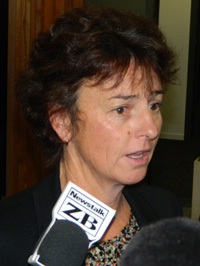Many speakers at an Auckland City Council advisory panel seminar say that combating racism means talking about white privilege and white supremacy. Anna Majavu reports for the Pacific Media Centre.
REPORT: New Zealand is a racist place, say participants at an ethnicity forum - but views are divided on whether the problem is a lack of tolerance across the board or white institutional racism against people of colour.
Auckland mayor Len Brown told a conference on racism convened by Auckland Council’s Ethnic People’s Advisory Panel at AUT University today that racism existed in New Zealand and Auckland, and that it should be combated.
But he also claimed that New Zealanders had confronted racism “from the get go”.
Brown said Auckland was known for its leadership on race relations and for confronting the issue of “how we get on with each other”.
In multicultural Auckland, people needed to learn to “love each other”, said Brown. Newly appointed Race Relations Commissioner Dame Susan Devoy said racism would exist for as long as people feared those who were different to them, and urged the audience to “celebrate cultural diversity” if they wanted to counter racism.
Newly appointed Race Relations Commissioner Dame Susan Devoy said racism would exist for as long as people feared those who were different to them, and urged the audience to “celebrate cultural diversity” if they wanted to counter racism.
But she added that she had heard many concerns from people of colour about how they could not seem to get employment that matched their skills.
Institutional racism
Many of the audience members, hailing from countries all over the world, spoke instead about the institutional racism they had faced in New Zealand – from being pulled over by police for no reason, to sitting down on public transport next to white people who immediately vacated their seats, to being racially profiled for searches at the airport while whites were left alone.
“A large percentage of the world doesn’t expect my race to succeed in anything except sport and gaining weight” said high school pupil Lute Sikalu, who hails from Tonga.
Sikalu said she hoped that in future, employers would not be quick to discriminate against her when they saw her name on her CV.
Marvin Kimata of the African Communities Forum said he had experienced “all kinds of racism” in New Zealand, while Shriya Bhagwat Chitale, associate editor of the Indian Weekender newspaper, questioned whether Kiwis had open enough minds to welcome Indians into their hearts as friends.
Panel chairperson Dr Camille Nakhid, who is also acting chair of the advisory board of the Pacific Media Centre, was just one of the many speakers who pointed out that combating racism meant talking about white privilege and white supremacy.
The panel had “met with a considerable amount of opposition” to its plan to hold a conference on racism, Nakhid said.
“While we are busy deciding whether or not racism exists, the further we are left behind and more disadvantaged we become, and those structures that maintain racism become more entrenched,” she said.
‘Losing power’
Racism was about “the fear of losing the power to exclude and include, to say what is normal” she said.
A key complaint from members of the audience was that New Zealand employers discriminated against people of colour when deciding who to give jobs to.
Dennis Maga, co-ordinator of First Union’s union network of migrants, pointed out that the job market in the retail sector was heavily racialised.
“Some popular companies go to the United Kingdom every May to recruit managers. Who has the power to discriminate? Those in charge,” said Maga.
His union had found that many retail stores employed white South Africans as managers, with Filipino, Fijian and other workers of colour only being given lower level jobs.
Some stores employed Indian night shift managers purely because they wanted to employ young workers from India with student visas for the night shift.
Educator Maryam Perreira said white power was not about neo-Nazis clubbing people at bus stops, but about the continual promotion of a Eurocentric view which insists that whites are normal and does not allow for any positive views of people of colour.
White supremacy
New Zealand, a colonial project, was built on white power, with white supremacy continuing to exist.
Until biculturalism is taken seriously, multiculturalism will not flourish, and gatekeepers would continue to close the doors of opportunity to indigenous people and people of colour, said Perreira.
“We’ve had the legislation but nothing is changing and the people at the top are not opening those gates,” Perreira said.
Pak ‘n Save franchise owner Brian Carran said he had won awards for fostering diversity in the workplace, but was “starting to lose enthusiasm” for African workers because some had used his store as a stepping stone before packing their bags for Australia.
“When you pay people minimum wage, what do you expect them to do?” asked unimpressed student Robert Ring.
The conference came just days after a poll that was run by The Vote on TV3 found that 76 percent of respondents believed that New Zealand was racist.
Anna Magavu is a journalist and Master of Philosophy student in AUT University’s School of Communication Studies.
This work is licensed under a Creative Commons Attribution-NonCommercial 3.0 New Zealand Licence.



